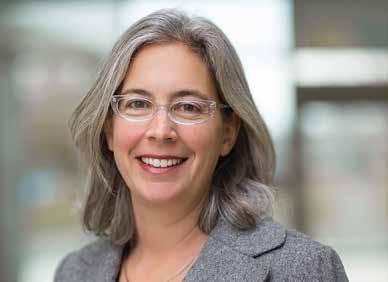
9 minute read
Education
Amid Teacher Shortages in the District, Substitute Teachers Demand Higher Pay
Sam P.K. Collins WI Staff Writer
Even as they demanded a benefits package, legal protections and pay comparable to full-time teachers, hundreds of substitute teachers continued to work and risk their health at several District public schools this academic year amid staffing shortages and COVID-induced closures.
Now, as DC Public Schools [DCPS] prepares to pull veteran teachers out of retirement to serve as substitutes at a substantially higher rate, a group of substitute teachers has taken their fight to the steps of the John A. Wilson Building.
“Starting at $15 per hour is way too low and we don’t even get a gradual salary increase [as] government employees,” said a substitute teacher and participant in “A Day of Absence” who requested anonymity.
On Monday, Dec. 10, the substitute teacher counted among dozens who converged in front of the Wilson Building in Northwest for several hours, holding signs, belting chants and making known their cause. They expressed plans to conduct “A Day of Absence” every following Monday until DCPS and city officials meet their demands.
The substitute teacher, who has served at five public schools across the District, said they transitioned into that work nearly four years ago after their previous employer downsized. Though they find the flexibility appealing, the substitute teacher said it’s often difficult to pursue their interests while tending to financial obligations in an increasingly expensive city.
“There’s no sick leave, health insurance or any kind of legal protection,” the substitute teacher said. “That’s what we’re asking for in addition to the substantial raise in pay. We’ve been organizing since 2018 and we’ve been at the table with the chancellor’s office. They’ve been very nice but haven’t done enough.”
Celebration of Life and Homegoing for Remola Boykin
Sunrise: July 2, 1927 • Sunset: January 2, 2022
Thursday, January 13, 2022 Viewing: 10:00 AM – 11:00 AM Celebration of Life: 11:00 AM – 12:00 PM
Greater People’s Union Baptist Church New Location: 3601 Southern Avenue Suitland, MD 20746
Live Steam Service: https://www.facebook.com/GPUBaptistChurch
OBITUARY
On Sunday, January 2nd, 2022, Remola Boykin was called home at the age of 94. She was born in Rich Square North Carolina as the youngest of five children born to Junious and Lillie Jacobs. Her siblings John Jacobs, William Jacobs (Cornelia), Thelma Horne (Lucius), and Percel Jacobs preceded her in death. Remola migrated from North Carolina to Washington, DC with her family in 1936. She accompanied her mother when she joined the Mt. Joy Baptist Church and then the Greater People’s Union Baptist Church. Remola married Jefferson Boykin of Clinton, NC (deceased) in 1951. She had three children Linda Jenkins, Hilda Boykin, and Jefferson Boykin Jr (deceased). Remola led a life of service. She joined the Nurses Unit of Greater People’s Union Baptist Church and the Ladies First Aid Union of Churches in 1969. She held various positions including Vice President and Sargent at Arms. Remola was a member of the International Masons and Order of the Eastern Star where she served in different positions over the years. She leaves to cherish her memory two daughters Linda Jenkins and Hilda Boykin, seven grandchildren, 18 great grandchildren, 16 great-great grandchildren; and a host of nieces, nephews and cousins.
5 Former Deputy Major for Education Abigail Smith (Courtesy photo)
Deadline Extended for Task Force to Determine Compensation for Early Childhood Educators
D.C. Council Approves Change of Date to April for Group’s Final Recommendations
Sam P.K. Collins WI Staff Writer
A group of business owners, advocates and researchers now have until the spring to compile and present recommendations specifying how the District government disburses funds that make early childcare educators’ pay equal to that of District public school teachers.
Earlier this month, the D.C. Council agreed to give the Early Childhood Educator Equitable Compensation Task Force until April to hammer out the details of a compensation system that substantially raises the salaries of early childhood educators in accordance with their role, credentials and on-the-job experience.
The task force’s formation follows the funding of the Birth-to-Three For All DC Act which mandates wage parity for early childcare educators but didn’t quite determine how it would come to fruition.
With more than $120 million budgeted toward this effort over the next two years, task force members have expressed a commitment to approaching the issue with as much nuance as possible.
“By the end of the task force, we would have produced recommendations that will start an early educator compensation program. There’s nothing like that in the country,” said Ruqiyyah Anbar-Shaheen, a task force member and director of the DC Under 3 coalition, which advocated for the Birth-to-Three for All DC Act’s funding last budget season.
Anbar-Shaheen counts among a cadre of program leaders, association directors, teachers, university researchers and economists who serve on the task force. Former Deputy
EDUCATORS Page 23
THE LATEST CHAPTER IN A MOVEMENT
Throughout the school year, a dearth of teachers has compelled administrators to, not only employ substitute teachers, but take over classrooms, split classrooms between teachers and ask teachers to lead instruction during their planning period. The overlap in responsibilities has been credited as a cause of inconsistent COVID-19 mitigation.
To the dismay of DCPS substitute teachers, DCPS announced plans last year to incentivize DCPS retirees to return to the classroom. Those who agreed to serve 90 consecutive days as substitute teachers stand to receive a $4,500 signing bonus in addition to $300 a day in compensation after their first 30 days on the job.
Non-DCPS retiree substitutes currently earn $120 per day within the first 30 consecutive days of service. After 30 days, the daily rate jumps to $150.
In a statement, affiliates of Washington Substitute Teachers United [WSTU] said such a move on the part of DCPS shows that officials have enough resources to adequately pay substitute teachers.
“A Day of Absence” counts as the latest chapter in a movement that started nearly four years ago when WSTU started engaging DCPS, the D.C. Council and the Office of the Deputy Mayor of Education in conversations about higher pay for substitute teachers.
Since 2008, when they last received a pay bump, substitute teachers, many of whom hold a bachelor’s degree or higher, earned $15 per hour. Last year, District officials in-
SUBSTITUTES Page 43

(Courtesy photo)
EDUCTORS from Page 22
Mayor for Education Abigail Smith serves as a third-party facilitator.
The task force has been scheduled to issue preliminary recommendations to the D.C. Council on Jan. 15 that will determine how the city allocates $53 million this fiscal year. The submission of another set of recommendations in April concerns $73 million set aside for the next fiscal year.
By the fall, when the District enters a new fiscal year, early childhood educators should expect a bonus as an acknowledgement of their work during the pandemic. Shortly after, the pay increases would go into effect.
“It’s an exciting opportunity to start paying the teachers caring for little kids closer to their worth,” Anbar-Shaheen said. “In Chocolate City, where many of our Black and brown teachers are not able to afford to live here, I’m excited about this. The funds are sitting in a bank account and once the legislation is updated, they can use them.” ESTABLISHING A TIMELINE TO SPEND FUNDS

Data shows that the average base salary of an early childhood education educator in D.C. stands at $36,700, or less than $19 per hour. Throughout the pandemic, much of the advocacy for the Birth-to-Three for All DC Act highlighted the struggles of community childcare facilities to attract top-notch talent and maintain services.
For months, the Early Childhood Educator Equitable Compensation Task Force, in conjunction with the Office of the State Superintendent of Education [OSSE], debated how the salary scale created by the local agency would best create a pathway to compensate teachers for experience. Another aspect that dominated conversations among task force members involved program oversight and how best to hold the District accountable to early childhood education workers.
During a Jan. 04 legislative meeting, council members unanimously approved the extension of the task force’s deadline. Moments earlier, council members expressed concerns about, with the extension, whether OSSE would be allowed to disperse the funds allocated for this fiscal year before D.C. Mayor Muriel Bowser submits the budget for the next fiscal year.
In speaking about the task force’s importance, D.C. Council Chairperson Phil Mendelson (D) called it a piece of a puzzle to create an environment where young people receive a quality education at every point in their lives.
He said the task force, and Birthto-Three for All DC Act, builds upon D.C. Councilmember Vincent Gray’s work throughout the 2000s to expand preschool access.
“Most people think of early childcare as nothing more than daycare, but it’s actually education,” Mendelson said. “In order to attract and retain early childhood educators, we need to make the compensation system better. The issue of better pay is critical to ensuring that we have top-quality early childhood care.” ALLOWING ROOM FOR ALL CHILDCARE CENTERS TO GROW
For Cynthia Davis, early childcare educator compensation has also become a matter of maintaining longevity in the industry.
Davis, owner of Kings and Queens Childcare in Northwest and an Early Childhood Educator Equitable Compensation Task Force appointee, said home-based family childcare centers like the one she runs often receive significantly less in OSSE subsidies than their counterparts who operate child development programs in centers and schools. This affects her bottom line and her ability to grow the capacity of her business.
As the number of clients grows, OSSE regulations require her to hire more workers, which becomes an arduous battle in balancing a small budget that affects her bottom line and ability to expand the capacity of her business.
That’s why Davis has spent much of her time highlighting this challenge and fighting to ensure equity for home-based child development centers – often referred to as “family childcare.”
“We shouldn’t have to use our retirement and other income to sustain our businesses. Government funding for childcare should be evenly distributed, regardless of the setting,” said Davis, who’s also executive director of the DC Family Child Care Association.
“If this pay increase actually happens, it will affect family childcare in a way that has never happened,” she said. “Home-based child development programs have never been equally supported in legislation like this before and now we’re being included.”
“It’s an exciting moment in time. Hopefully, as we continue to advocate for the field of early childhood education, there will be an increase in compensation and respect for the educators in this profession,” Davis said. WI @SamPKCollins









